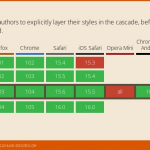过去的一种常见情况是,您在另一个元素中有一个元素,您希望它出现在父元素的后面。例如:
<div class="parent">
I am the parent
<div class="child">
I am the child, but I want to be behind my parent
</div>
</div>
默认情况下会产生如下结果:
I am the parent
I am the child, but I want to be behind my parent

要使其正常工作,您必须将孩子从父母中移除,这并不总是可能的。使用现代 CSS,您可以通过沿 Z 轴平移元素来解决此问题。对于我们的示例,这需要将以下代码添加到子级和父级:
.parent {
transform-style: preserve-3d;
}
.child {
transform: translateZ(-10px)
}
我们最终的 CSS 如下所示:
.parent {
background: linear-gradient(45deg, #ff4ea0, #0043ff);
width: 200px;
height: 200px;
border-radius: 10px;
font-weight: 700;
padding: 1rem;
box-shadow: 0 2px 30px rgb(0 0 0 / 50%);
margin-bottom: 4rem;
transform-style: preserve-3d;
}
.child {
background: linear-gradient(45deg, #4effef, #0014ff);
width: 200px;
font-weight: 700;
height: 200px;
border-radius: 10px;
position: relative;
top: 30px;
left: 30px;
padding: 1rem;
box-shadow: 0 2px 30px rgb(0 0 0 / 50%), 0 0 0 1px rgba(0,0,0,0.05);
transform: translateZ(-10px)
}
这导致孩子现在出现在父母后面:
I am the parent
I am the child, but I want to be behind my parent





